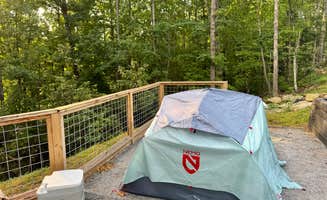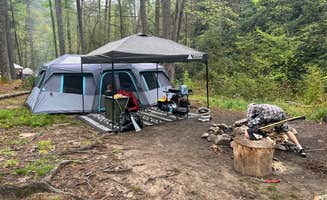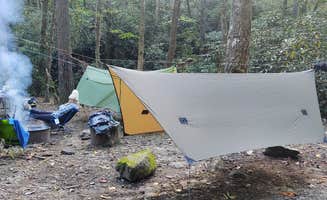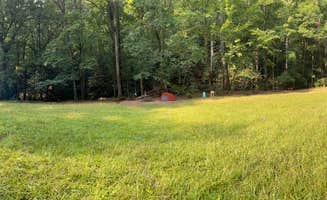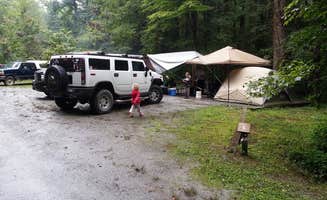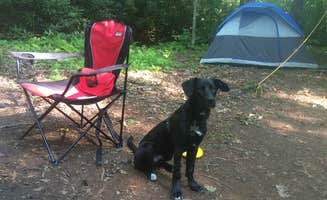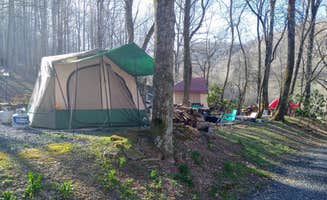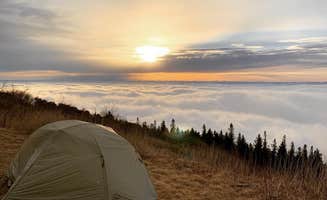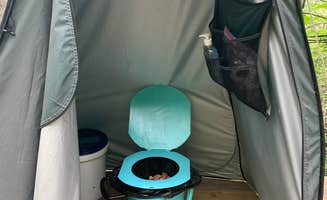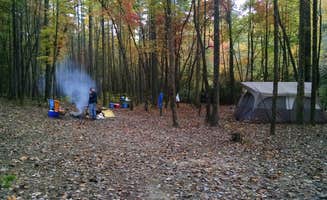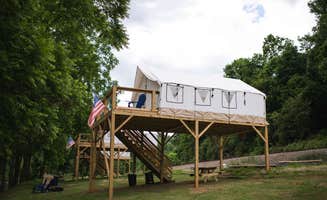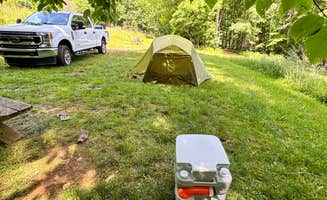Tent camping near Glen Alpine, North Carolina offers access to diverse terrain including lake shores, forest settings, and mountain backcountry areas. The region encompasses elevations ranging from 1,200 to 2,800 feet with moderate summer temperatures averaging 75-85°F during peak camping season. Winter camping remains accessible at many sites with temperatures rarely dropping below 30°F, though backcountry access may be limited during winter precipitation.
What to do
Water activities at Lake James: Swimming access at Paddy's Creek provides a dedicated beach area with lifeguards during summer months. The swimming area requires a small fee when lifeguards are on duty. A camper notes, "The campground is a 2-minute drive (6-minute bike ride) down to the beach and there is a huge swimming area there."
Waterfall hikes: Multiple accessible waterfalls within 30 minutes of most campsites. Upper Falls Campsite offers tent sites near water features. "Get ready. You are about to hike up a LOT of sleep stairs. The sites are really well laid out. Site 3&4 are my favorites because they are close to water access (bring a good filter)."
Creek exploration: Several campgrounds feature creek access for rock hopping and wading. Wilson Creek area offers tube floating opportunities during summer months. The area functions as a natural lazy river for recreation during warmer seasons.
What campers like
Secluded tent sites: Many campers appreciate the privacy of walk-in sites at Black Bear Campground where sites are "far enough away from each other some are close enough for couple families together." Another notes it's "perfect for someone new to camping as the utilities are very clean and you don't feel extremely isolated."
Clean facilities: Multiple campgrounds maintain high cleanliness standards in bathroom facilities. One camper described Paddy's Creek as having "the cleanest bath/shower house I have ever experienced camping," while another mentioned Black Bear's "restrooms are in immaculate condition."
Water sounds: Campsites near creeks and streams offer natural white noise for sleeping. At Steele Creek, sites are arranged along the creek, providing ambient sounds. A camper shared: "My favorite part is definitely The creek, it is a great spot to swim so we are excited about that."
What you should know
Access challenges: Some campgrounds require navigation of dirt roads. Mortimer Campground requires preparation as "9 miles, minimum, of dirt roads getting in, so pack accordingly. Quick trips don't happen." Another camper noted: "This campground is down a pretty long gravel road, so it's best to have what you need when you arrive."
Water filtration: Backcountry sites often require water treatment. At South Mountains State Park, water sources may be distant from campsites. Winter camping presents fewer insect issues but requires additional warmth considerations.
Site reservations: Availability varies seasonally with summer weekends filling quickly. Some campgrounds operate first-come, first-served only. One camper wished Black Bear Campground had "a first come first serve and not just on line reservation."
Tips for camping with families
Beginner-friendly options: Several campgrounds offer easier access points for families with young children. Camp Attocoa provides assistance with gear transport: "The owner will have you park and will haul you and your gear in and out."
Swimming holes: Kid-friendly water access points with shallow areas available at multiple locations. Steele Creek features a swimming hole "at the end of the road about 100 feet from our site, that had the best swimming hole at the end of it, where you can jump in."
Short hike options: Trails under 1 mile suitable for children available near most campgrounds. Mortimer Campground features "a 1/2 mile round trip hike to a waterfall on the property!"
Tips from RVers
Site limitations: Most tent-focused campgrounds have limited RV access. Some campgrounds like Little River Backcountry require hiking in, making them unsuitable for any RVs.
Alternative parking: Some areas allow parking at trailheads for backpack camping. Day-use parking may have restrictions during peak seasons requiring early arrival.
Size constraints: Small camper vans and truck campers can access more sites than larger RVs. At Mortimer Campground, "We stayed in a tent. Had some friends stay next to us in a class b. A small trailer would fit, nothing big. No W/E/S but great place."


